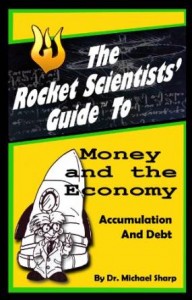Most books about economics are turgid and abstruse, so most people are intimidated and mystified by this crucial topic. Now sociologist Dr. Michael Sosteric (pen name Michael Sharp) has written a helpful guide to it. He has a gift for explaining complex, abstract concepts in simple, easy-to-understand language, and his clear prose is a refreshing antidote to the murk of much economic writing.
Entitled The Rocket Scientists’ Guide to Money and the Economy, the book explains the fundamentals of economics and gives us an historical overview of their development. With the help of a fable and graphics it shows how value is created by human labor, which is then abstracted into the form of money to facilitate the exchange of goods and services.
 Early communal societies functioned quite well on an egalitarian basis until increases in productivity led to the accumulation of surplus value. Commodities could now be exchanged for more than the labor value it took to create them. Rather than returning this surplus value back into the community that created it, some people involved in the exchange activities of the economy — the early merchants — began keeping it as their private property, their profit. Their accumulation of these profits gave them power over other people. This gradually led to the development of social classes, inequality, and oppression — the modern world.
Early communal societies functioned quite well on an egalitarian basis until increases in productivity led to the accumulation of surplus value. Commodities could now be exchanged for more than the labor value it took to create them. Rather than returning this surplus value back into the community that created it, some people involved in the exchange activities of the economy — the early merchants — began keeping it as their private property, their profit. Their accumulation of these profits gave them power over other people. This gradually led to the development of social classes, inequality, and oppression — the modern world.
This has now reached the point where we may annihilate ourselves unless we replace this fundamentally unjust system of class domination with a true economic and social democracy, where the resources and productive capacity of the world belong to its people, who use them to meet human needs rather than to generate private profits for a few owners. Sharp gives us practical guidelines for achieving this and inspires us that, yes, it can be done and we are the ones to do it.
He examines such features of capitalism as planned obsolescence, the enslaving effects of debt, the inevitability of war, patriotic indoctrination to defend and strengthen the status quo, the co-opting of opposition movements into superficial reforms, and the role of entertainment and fashion in distracting us from our increasingly unpleasant reality.
One of the things I like best about the book is that Sharp is not an economic reductionist. He doesn’t claim that money is the most important aspect of the universe. His view is much more complex, based on the ways economics interact with ecology, social harmony, gender and family relations, inner self worth, and spirituality. His book is an excellent guide to understanding the crippling economic pressures we’re living under … and freeing ourselves from them.
Another thing I like about it is that he takes his commitment to alternative economics seriously, offering his book as payment optional, a free PDF download for those who feel they can’t afford it.










